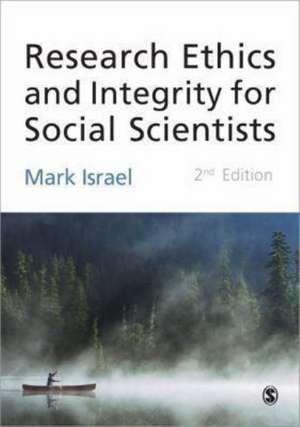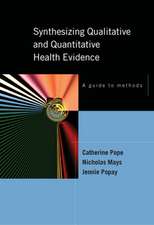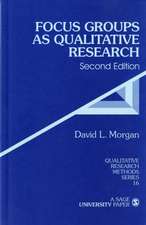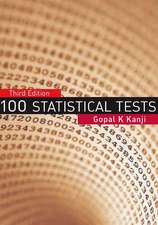Research Ethics and Integrity for Social Scientists: Beyond Regulatory Compliance
Autor Mark Israelen Limba Engleză Paperback – 9 noi 2014
Through case studies and examples drawn from all continents and from across the social science disciplines, the book:
- demonstrates the practical value of thinking seriously and systematically about ethical conduct in social science research
- identifies how and why current regulatory regimes have emerged
- reveals those practices that have contributed to the adversarial relationships between researchers and regulators
- encourages all parties to develop shared solutions to ethical and regulatory problems.
Preț: 393.38 lei
Nou
Puncte Express: 590
Preț estimativ în valută:
75.28€ • 78.50$ • 62.57£
75.28€ • 78.50$ • 62.57£
Carte disponibilă
Livrare economică 28 februarie-14 martie
Livrare express 13-19 februarie pentru 35.18 lei
Preluare comenzi: 021 569.72.76
Specificații
ISBN-13: 9781446207499
ISBN-10: 1446207498
Pagini: 264
Dimensiuni: 170 x 242 x 14 mm
Greutate: 0.45 kg
Ediția:Second Edition
Editura: SAGE Publications
Colecția Sage Publications Ltd
Locul publicării:London, United Kingdom
ISBN-10: 1446207498
Pagini: 264
Dimensiuni: 170 x 242 x 14 mm
Greutate: 0.45 kg
Ediția:Second Edition
Editura: SAGE Publications
Colecția Sage Publications Ltd
Locul publicării:London, United Kingdom
Recenzii
This comprehensive and detailed book will hearten the many social scientists who tangle with unsympathetic regulatory systems. Mark Israel demonstrates an uncanny knowledge about the variety of national ethics regimes that are destabilizing the social sciences. The author explores the possibility of moving the hard architecture of research-review to a soft architectural one. In the end, the book calls for a creative and intelligent approach to ethics and integrity in research.
Research ethics is a particularly fluid field of endeavour in the social sciences. As the forms of social interaction develop via new media and societies undergo constant change, responsive methodological innovation follows. The ethical challenges posed raise more dilemmas and regulatory responses. Mark Israel’s update of his earlier book covers this rapidly evolving field in a rigorous, readable and comprehensive manner. The global perspective adopted is of practical benefit to increasingly international and multidisciplinary research teams. The extensive case studies reported both enliven and challenge our moral sensibilities in constructive and thoughtful ways. This work continues to offer valuable insights into the increasingly complex ethical decisions addressed by social scientists.
Mark Israel’s masterly account and critical analysis of the global, national and conceptual histories of research ethics explains the contemporary frictions between research ethics regimes and social science researchers.
Through authoritative examples of realistic practice that address ethical complexities of consent, confidentiality, risk, benefit and conflicts of interest, he shows how to address and resolve these frictions.
The book offers a rich collection of experience to inform reflective ethical research practice and essential insights for ethics reviewers of social science research.
This book explains and compares the regulation on research ethics in many different countries. Israel conducted a deep analysis on the roots of these regulations as well as the consequences for social scientists. It puts the key issues into a historical, philosophical and empirical research context. This discussion is fundamental to better understand the contemporary situation and to plan actions to promote ethical research, respecting different academic communities, as well as promoting and protecting the human rights and the fundamental liberties of research participants. I strongly recommend it for everyone interested in this subject and specially for Research Ethics Committees members, chairs, administrators; policy makers; and for social science and humanities researchers.
In this book Professor Israel presents an absorbing critical account of the development of national and, increasingly, global research ethics and regulatory systems. The many case studies included within the text bring to life the dilemmas researchers have faced in a way that provides the reader with much food for thought.
The reviewer thoroughly enjoyed reading this book. Professor Israel brings clarity of thought to what can be a very obtuse and confusing area, albeit one of vital importance for the future development of research. I can fully recommend it both the seasoned researcher and to those beginning in the field who require a sound and readable introduction to research ethics in the social sciences.
The book should be seen as an important introduction to ethics and integrity for researchers and regulators, as it provides a view of both ranks and understanding for both research practice and the history and importance of testing frameworks.
Research ethics is a particularly fluid field of endeavour in the social sciences. As the forms of social interaction develop via new media and societies undergo constant change, responsive methodological innovation follows. The ethical challenges posed raise more dilemmas and regulatory responses. Mark Israel’s update of his earlier book covers this rapidly evolving field in a rigorous, readable and comprehensive manner. The global perspective adopted is of practical benefit to increasingly international and multidisciplinary research teams. The extensive case studies reported both enliven and challenge our moral sensibilities in constructive and thoughtful ways. This work continues to offer valuable insights into the increasingly complex ethical decisions addressed by social scientists.
Mark Israel’s masterly account and critical analysis of the global, national and conceptual histories of research ethics explains the contemporary frictions between research ethics regimes and social science researchers.
Through authoritative examples of realistic practice that address ethical complexities of consent, confidentiality, risk, benefit and conflicts of interest, he shows how to address and resolve these frictions.
The book offers a rich collection of experience to inform reflective ethical research practice and essential insights for ethics reviewers of social science research.
This book explains and compares the regulation on research ethics in many different countries. Israel conducted a deep analysis on the roots of these regulations as well as the consequences for social scientists. It puts the key issues into a historical, philosophical and empirical research context. This discussion is fundamental to better understand the contemporary situation and to plan actions to promote ethical research, respecting different academic communities, as well as promoting and protecting the human rights and the fundamental liberties of research participants. I strongly recommend it for everyone interested in this subject and specially for Research Ethics Committees members, chairs, administrators; policy makers; and for social science and humanities researchers.
In this book Professor Israel presents an absorbing critical account of the development of national and, increasingly, global research ethics and regulatory systems. The many case studies included within the text bring to life the dilemmas researchers have faced in a way that provides the reader with much food for thought.
The reviewer thoroughly enjoyed reading this book. Professor Israel brings clarity of thought to what can be a very obtuse and confusing area, albeit one of vital importance for the future development of research. I can fully recommend it both the seasoned researcher and to those beginning in the field who require a sound and readable introduction to research ethics in the social sciences.
The book should be seen as an important introduction to ethics and integrity for researchers and regulators, as it provides a view of both ranks and understanding for both research practice and the history and importance of testing frameworks.
Cuprins
Why care about ethics?
Ethical approaches
Codes and principles
Regulating ethics
Informed consent
Confidentiality
Avoiding harm, doing good and seeking justice
Integrity and misconduct
Relationships
Beyond regulatory compliance
Ethical approaches
Codes and principles
Regulating ethics
Informed consent
Confidentiality
Avoiding harm, doing good and seeking justice
Integrity and misconduct
Relationships
Beyond regulatory compliance
Notă biografică
Descriere
This book explores recent developments and debates around researching ethically and with integrity, and complying with ethical requirements, and has been updated and expanded to now cover issues relating to international, indigenous, interdisciplinary and internet research.







